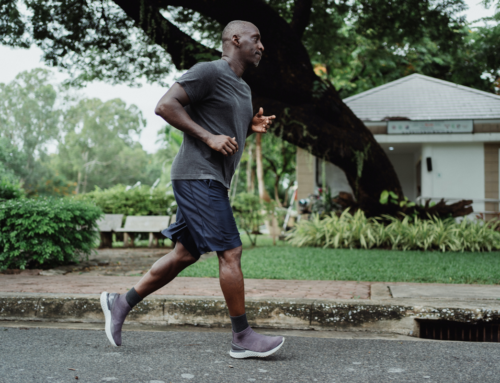You’ve probably heard that if you’re feeling thirsty, you’re likely already dehydrated.
Well, it’s sort of true. Thirst is basically your body’s way of telling you to get some sort of liquid into it. Your fluid levels are always fluctuating depending on the foods you eat and what you excrete.
While a parched mouth may only mean that your fluid tank is down by 1.5 per cent (which is by no means dangerous),[1] it could also mean that you’re borderline dehydrated.[2] If you find yourself heading for the water tap again and again, you should explore what else might be going on.
But there could be a host of reasons as to why you might have a persistent dry mouth. It could be as simple as sleeping with your mouth open and not breathing through your nose, or not drinking enough water while you’re exercising.
But being thirsty all the time can also signal a serious medical condition.
In technical terms
Xerostomia is the clinical name for having a dry mouth. It means that there’s not enough saliva to help you chew, eat, swallow or talk.[3] Everyone suffers from it from time to time, especially when they’re in situations that make them nervous.
Maybe it’s your medication
There are over 400 different medications that can cause a dry mouth. OTC antihistamines, decongestants and sedatives, or more specific prescription medicines like antidepressants, anti-Parkinson and anti-hypertensive drugs can all be culprits.[4] A lot of medicines act as diuretics, increasing your urine output and causing you to become dehydrated.[5] Your kidneys act as water sensors – too much and they send you to the bathroom, not enough and they send you in search of fluids.
The food-thirst connection
Ever notice how your mouth feels after you eat a bag of chips? It’s almost like the sodium sucks every bit of moisture out of it. In fact, OD-ing on salt can cause you to suffer from hypernatremia, a condition where your body has too much sodium and not enough water.[7] Though a small amount of sodium is necessary for optimum muscle and nerve function, too much sends that signal to the kidneys to flush it out – and all the extra fluids along with it.[8]
Even spicy foods can send you running for a cool glass of water, but not just because your tongue is on fire. Eating a meal with lots of heat slightly increases your body temperature, so in order to bring it back down, that thirst reflex kicks in once again.[9]
Strangely enough, reducing carbohydrates in your diet can also make you thirsty. When you reduce carbs you lose water weight, because both are stored in the body together. Certain carbohydrates like oats, brown rice and pastas absorb liquids when cooked and are a good source of hydration.[6] Cutting them out can leave you on the hunt for fluid replacement.
Alcohol and caffeine
Try to make it a rule to have a glass of water for every cup of coffee you drink. Though caffeine itself isn’t dehydrating in small amounts, it can quickly turn the other way if you drink more than 500 milligrams, or about three to five cups, a day.[10]
Drinking alcohol decreases the body’s production of antidiuretic hormone (ADH), which the body uses to reabsorb water. When that hormone is compromised, more fluid than usual is excreted, leaving your body begging for water.[11] You might be familiar with that foggy feeling the morning after a night out. Vomiting also causes fluid loss, just saying…
Naturally dry
Though they can be very effective solutions for many health issues, some natural remedies cause increased urinary output and can make you feel thirsty. Dandelion, ginger, parsley, hawthorn and juniper[12] all have natural diuretic side effects, so check your supplement labels if you feel like your remedies might be leaving you a little parched.
Treat your diabetes
You may have already been diagnosed or be just on the cusp. Either way, having a constant dry mouth can be a big red flag for diabetes. When you’re diabetic, glucose builds up in the blood and your kidneys are called in to work double time to filter and absorb the extra sugar. If your kidneys can’t keep up the pace, the excess sugar ends up in your urine, bringing along fluids from your tissues. The more you urinate, the more you become dehydrated. The more water you drink, the more you’ll urinate still; it becomes a constant cycle until your diabetes is treated.[13]
Watch your mouth
Saliva is important for washing away food particles and plaque. Severe tooth decay and gum disease can result if you have constant dry mouth, so drink water to keep the saliva going. About 30 per cent of tooth decay in older adults is caused by low saliva levels.[16]
The nerve of it
Suffering any kind of head or neck trauma can damage nerves that carry messages from the brain to the salivary glands telling them to make saliva. Radiation on the head and neck, as well as chemotherapy drugs used to treat certain cancers, can also decrease saliva production. The results can be temporary or permanent, depending on the length and intensity of treatments.
So those are some real reasons why you might be craving a tall, cool, glass of water more than usual. There are also some myths around why you might feel thirsty, and how to tell if you’re really dehydrated. We’ll try to set the record straight for you here with these FAQs:
Is it possible to drink too much water?
Though rare, it does happen, especially in very hot weather, or if you are an extreme competitive athlete. Drinking small amounts over longer periods of time is ideal. That way the kidneys can keep up with the extra intake of fluids and process and excrete them at a reasonable rate.
When too much water is ingested too quickly, the kidneys can’t keep up and dilute and reduce important electrolytes. As your body works to balance levels out, you might feel tired or nauseated and suffer from muscle cramps or vomiting.[14]
Do I really need eight glasses of water a day?
There is no hard and fast rule regarding how many glasses of water you should drink per day. Actually, the recommendation should include all fluids, sugary drinks excluded.
What you really need to examine is how active you are, the climate that you live in, and if you already consume foods with high water content. The Institute of Medicine recommends about three litres of total beverage intake a day for men, 2.2 litres for women.
About 20 per cent of your water is already contained in the foods you eat, the rest is up to you to take in whenever and however much you want. Of course if you live in a hot and humid climate, or you sweat a lot when you exercise, you’ll want to drink more.[15] Just listen to your body.
Does the colour of my urine tell me if I’m dehydrated or not?
It can be alarming to see dark urine, but the colour does indicate how dehydrated you might be. If it’s amber or honey coloured, you are definitely dehydrated and should get some fluids into your body immediately. Dark yellow is normal but drinking a glass of water wouldn’t hurt. Transparent yellow or a pale straw colour is ideal, but if your urine is clear, you’re drinking too much water.
Some quick fixes
Say you’re parched but your water bottle is empty. What can you do to get the saliva going?
- Chew sugar-free gum or candy – chewing stimulates saliva flow, so always keep some mint, citrus or cinnamon flavoured gum or candy around
- Stay away from coffee, tea and sugary sodas – while small amounts of coffee and tea are okay, if you’re thirsty, they’re not the first beverages to turn to as they can make a dry mouth even worse
- Put the cigarette out – we know that smoking is bad in every way. A number of studies have shown that while cigarette smoking can typically cause a noticeable short-term increase in salivary flow rates, it’s still better for your mouth (and your health) if you butt out.[19]
- Saliva-stimulating mouthwashes and sprays – yes, they do exist. If you suffer from persistent dry mouth, look for products that contain xylitol, which is a natural saliva stimulator[17][18]
Sources:
[1] http://www.huffingtonpost.com/2013/06/27/dehydration-myths_n_3498380.html[2] http://www.health.com/health/gallery/0,,20815262,00.html
[3] http://www.nidcr.nih.gov/oralhealth/Topics/DryMouth/
[4] http://www.oralcancerfoundation.org/complications/xerostomia.php
[5] http://www.health.com/health/gallery/0,,20815262_4,00.html
[6] http://www.health.com/health/gallery/0,,20815262_5,00.html
[7] http://www.livestrong.com/article/476234-why-do-you-get-so-thirsty-when-you-eat-foods-high-in-sodium/
[8] https://www.nlm.nih.gov/medlineplus/ency/article/002415.htm
[9] http://www.livestrong.com/article/445101-i-drink-enough-water-but-still-feel-dehydrated/
[10] http://www.huffingtonpost.com/2013/06/27/dehydration-myths_n_3498380.html
[11] https://gastrolyte.com.au/dehydration/dehydration-and-alcohol/
[12] http://www.mayoclinic.org/healthy-lifestyle/weight-loss/expert-answers/water-retention/faq-20058063
[13] http://www.mayoclinic.org/diseases-conditions/diabetes/in-depth/diabetes-symptoms/art-20044248
[14] http://www.theglobeandmail.com/life/health-and-fitness/ask-a-health-expert/im-thirsty-all-the-time-should-i-be-worried/article4550394/
[15] http://www.huffingtonpost.com/2013/06/27/dehydration-myths_n_3498380.html
[16] http://www.toothwisdom.org/resources/entry/dry-mouth-causes-associated-problems-and-treatment
[17] http://www.medicinenet.com/script/main/art.asp?articlekey=24073&page=2#can
[18] http://www.mayoclinic.org/diseases-conditions/dry-mouth/expert-answers/dry-mouth/faq-20058424
[19] Bouquot DJ, Schroeder K. Oral effects of tobacco abuse. J Am Dent Inst Cont Educ . 1992;43:3–17







Leave A Comment